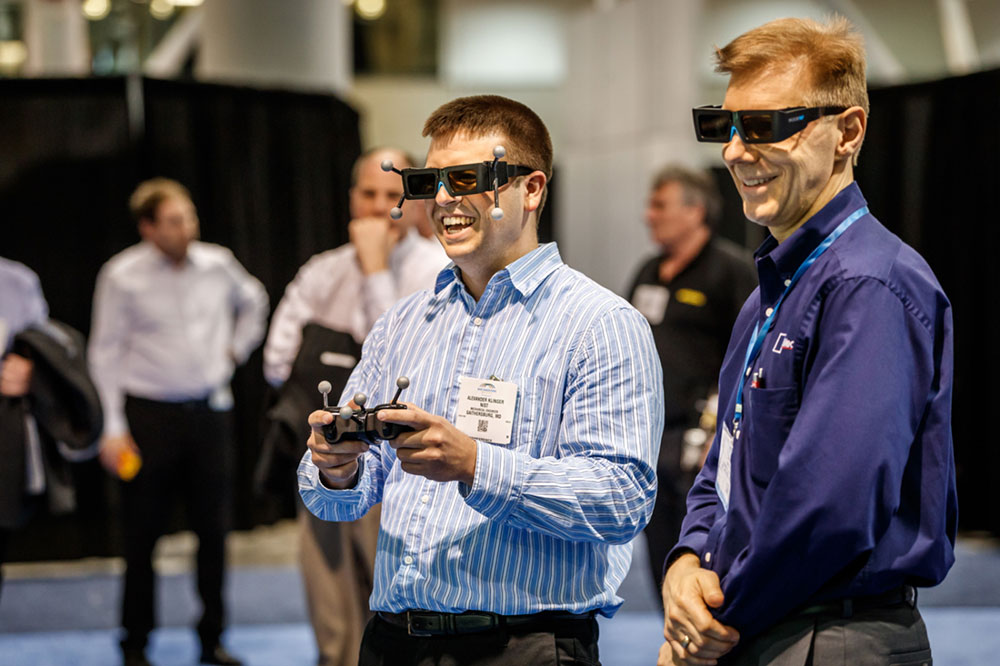Industry’s embrace of smart manufacturing brings fundamental changes in strategy, equipment technology and workforce transformation.

Augmented reality and virtual reality can be used for machine maintenance, product design, workforce training and manufacturing simulation.
By Julie Pike, Event Director – The Best of SMX, SME
Manufacturing is experiencing a renaissance in which the industry is rapidly adopting transformational technologies that are positively disrupting how common household items, appliances, automobiles and even large aircraft are made. This change to “smart manufacturing” has the potential to revolutionize the industrial sector.
Smart manufacturing enables machines to talk to one another, control operations remotely, predict issues and even share live data throughout the supply chain and manufacturing process. It encompasses the tools and processes that allow manufacturers to see and react to the performance of their machines and integrated systems with analytics in real time, and sometimes predictively.
Considering this market is expecting exponential growth, reaching $506.33 billion by 2027, it’s clear that manufacturers must take smart manufacturing adoption seriously and develop a strategic plan to build these technologies into overall operations. Despite much optimism about the growth potential in smart manufacturing, far too many manufacturers are finding implementation roadblocks to be more significant than potential opportunities. But manufacturers must develop, evaluate and execute strategies to become strong competitors as the industry shifts to integrated and flexible advanced manufacturing technology and tools.
SME, the professional association committed to advancing manufacturing and developing a skilled workforce, is dedicated to helping manufacturers integrate these technologies into their processes and ecosystems. It conducts an event biennially called Smart Manufacturing Experience or SMX, which will be held on Oct. 29. This year, it will be presented online as a virtual event for the first time and called The Best of SMX.
The organization has identified eight key advanced technologies destined to help manufacturers harness process data, analyze it and make informed decisions that will support forward-thinking organizations to improve their product quality, decrease costs and increase the productivity of their connected, smart factories.
These eight disruptive manufacturing technologies, which each contribute a uniquely shaped piece to the manufacturing puzzle, will be discussed in detail at The Best of SMX Virtual Event:
Adopting these technologies as part of a smart manufacturing strategy may seem daunting, but to ensure survival, it’s the only option for manufacturers intent on future growth and innovation. Leveraging the potential of these technologies will require manufacturing organizations to develop a flexible and robust implementation plan.
With a strategic and systematic plan, digital transformation can be manageable for manufacturers of every size. It starts by identifying your business value goal — reducing lead time, increasing quality, improving efficiency — and determining which data will help achieve that goal.
To integrate, accelerate, adopt smart technology, companies should take a few first steps to survive:
By following these steps, manufacturers can ensure their smart manufacturing strategy will pay off and their technology will reach its full potential.
When deployed right, the benefits — increased efficiency, productivity, competitiveness; improved quality and operations; shorter cycle times; optimized energy; increased innovation; cost reductions; and greater access to data — outweigh the challenges.

Julie Pike
Julie Pike is Event Director – The Best of SMX for SME, the organization that connects manufacturing professionals, academia and communities, sharing knowledge and resources to build inspired, educated and prosperous manufacturers and enterprises. She has been with SME in events management of 13 years, first serving as event manager, then director of Canadian events. Before SME, Pike was human resources manager for Reed Exhibitions Canada. She holds a Bachelor of Arts degree with honors in Psychology from the University of Guelph.
Contact:
www.sme.org
jpike@sme.org
Scott Ellyson, CEO of East West Manufacturing, brings decades of global manufacturing and supply chain leadership to the conversation. In this episode, he shares practical insights on scaling operations, navigating complexity, and building resilient manufacturing networks in an increasingly connected world.